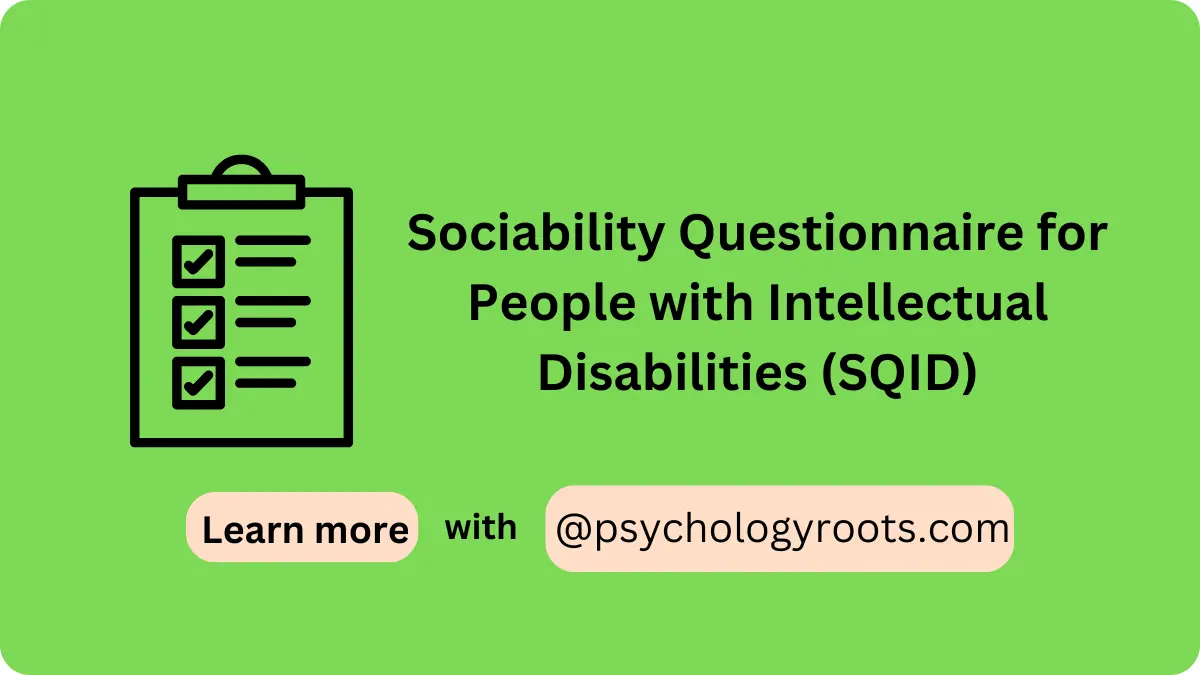Table of Contents
Sociability Questionnaire for People with Intellectual Disabilities (SQID)
Here in this post, we are sharing the “Sociability Questionnaire for People with Intellectual Disabilities (SQID)”. You can read psychometric and Author information. We have thousands of Scales and questionnaires in our collection (See Scales and Questionnaires). You can demand us any scale and questionnaires related to psychology through our community, and we will provide you with a short time. Keep visiting Psychology Roots.
About Sociability Questionnaire for People with Intellectual Disabilities (SQID)
Scale Name
Sociability Questionnaire for People with Intellectual Disabilities (SQID)
Author Details
Joanna Moss, Lisa Nelson, Laurie Powis, Caroline Richards, Jane Waite and Chris Oliver
Translation Availability
English

Background/Description
The Sociability Questionnaire for People with Intellectual Disabilities (SQID) is a specialized assessment tool designed to evaluate sociability traits in individuals with intellectual disabilities (ID). Developed by a team of experts, including Moss and colleagues, this questionnaire serves as a valuable resource for identifying sociability patterns and challenges across various intellectual and developmental conditions, such as Autism Spectrum Disorder (ASD), Angelman Syndrome, Cornelia de Lange Syndrome, Fragile X Syndrome, and Rubinstein-Taybi Syndrome.
The SQID provides structured insights into how individuals with intellectual disabilities engage in social interactions, allowing for targeted interventions and support planning. This tool is particularly significant in clinical and research contexts, where understanding sociability can help improve the quality of life and inform therapeutic approaches. Its development involved rigorous validation and comparative studies, ensuring its applicability across diverse populations and conditions.
The SQID is user-friendly, with a structured questionnaire format that can be administered to caregivers or directly to individuals depending on their abilities. It is a critical instrument in bridging the gap between observed social behaviors and the tailored support required to address sociability challenges in individuals with ID.
Administration, Scoring and Interpretation
- Obtain an authorized copy of the SQID and review all related materials.
- Explain the purpose of the questionnaire, emphasizing its focus on assessing sociability traits in individuals with intellectual disabilities.
- Provide clear instructions to the respondent (caregiver or individual) on how to complete the questionnaire.
- Inform respondents that the estimated time to complete the SQID is 15–20 minutes.
- Administer the questionnaire in a quiet, comfortable environment to ensure accurate responses.
Reliability and Validity
The SQID has demonstrated excellent reliability and validity across different intellectual and developmental conditions. Its psychometric properties have been rigorously tested, with high internal consistency and inter-rater reliability reported in comparative studies.
The validity of the SQID is supported by its ability to differentiate sociability traits among individuals with varying syndromic profiles, including those with autism, Angelman Syndrome, and Fragile X Syndrome. The instrument also aligns well with existing measures of social behavior, reinforcing its criterion validity.
The ongoing refinement of the SQID ensures its relevance and accuracy in capturing the unique sociability profiles of individuals with intellectual disabilities.
Available Versions
Multiple-Items
Reference
Moss, J., Nelson, L., Powis, L., Richards, C., Waite, J., & Oliver, C. (In press). A comparative study of sociability and selective mutism in autism spectrum disorder, Angelman, Cornelia de Lange, Fragile X, and Rubinstein-Taybi syndromes. American Journal of Intellectual and Developmental Disabilities.
Important Link
Scale File:
Frequently Asked Questions
What is the SQID used for?
It is used to assess sociability traits in individuals with intellectual disabilities.
Who developed the SQID?
The tool was developed by Moss and colleagues.
How long does it take to administer the SQID?
It typically takes 15–20 minutes to complete.
Can the SQID be used for specific syndromes?
Yes, it is particularly useful for assessing sociability in syndromes like Angelman Syndrome, Fragile X Syndrome, and Autism Spectrum Disorder.
Is the SQID reliable?
Yes, the SQID demonstrates high reliability and validity in various intellectual and developmental conditions.
Disclaimer
Please note that Psychology Roots does not have the right to grant permission for the use of any psychological scales or assessments listed on its website. To use any scale or assessment, you must obtain permission directly from the author or translator of the tool. Psychology Roots provides information about various tools and their administration procedures, but it is your responsibility to obtain proper permissions before using any scale or assessment. If you need further information about an author’s contact details, please submit a query to the Psychology Roots team.
Help Us Improve This Article
Have you discovered an inaccuracy? We put out great effort to give accurate and scientifically trustworthy information to our readers. Please notify us if you discover any typographical or grammatical errors.
Make a comment. We acknowledge and appreciate your efforts.
Share With Us
If you have any scale or any material related to psychology kindly share it with us at psychologyroots@gmail.com. We help others on behalf of you.